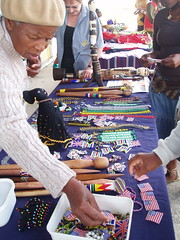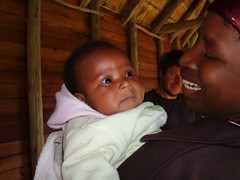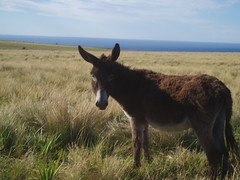"Small Things Count": a resource to those who approach their existence as a contribution to the world and how they live to making these initiatives happen in small or big ways.
Sunday, June 25, 2006
Port St. Johns
Im currently heading up the South Coast to an area called Port St. Johns through the Baz Bus company. Its this transport company that takes you from one backpackers to another, super convenient. So they are dropping me off at Jungle Monkey backpackers and well see from there how my one week study break is end up. Update when I get to the other side!
Sunday, June 18, 2006
Beadwork by Kwandengezi Community
This weekend, I travelled over to the Kwandengezi community (just outside of Durban) for a traditional Zulu lunch and "unique township experience". One of the girls in my course, Erin, has been volunteering for the Ethembeni Crisis Centre and hosted this fundraiser with the Rotary Club of Pinetown. We got in around 11am and checked out some of the beadwork by the women, enjoyed a local soccer match (the stands were filled with local kids), a huge lunch (curried chicken dish, tripe dish, homemade bread, desserts, etc) and watched some of the singers at the local hall. Good little study break.
Saturday, June 17, 2006
Finish (almost) Second Quarter!
I finally finished my second quarter classes! It has been close burnout term with lots of assignments and essays some of which I am still working on! Overall, I have learned alot from the three courses and I look forward to a much calmer course workload coming up (one course, 'Political Economy' in July and 'Social Policy' in October). The rest of the time will be spent on prepping for my dissertation and trying to pass through the Higher Degrees committee and finish research and get on with the dissertation.
Right now, I'm writing my final essay in HIV/AIDS in Southern Africa about witchcraft and its implication in HIV/AIDS. There have been some amazing Anthropology writers like Renyolds Whyte and Wright and Henderson who are investigating the ideas of social networks, traditional healers and how they can help in stopping the spread of HIV/AIDS. When you mention witchcraft, it's a sensitive subject that people would not discuss with others outside of their family or community. Statements like "AIDS is witchcraft" come out from outsiders and people within the community. People know how HIV/AIDS is biologically spread but, for a disease that holds little cure in the communities (especially where antiretrovirals treatment (ARVs) are hard to get, nutrition is poor, transport is scarce), it is more psychologically acceptable to think it is a spirit that keeps a person sick and that there could be possible ways to try to banish this spirit. In tight communities like in Uganda where kinship is strong due to ancestoral land ownership, families are collective and attempt to assist the sick according to directions of the traditional healers. They also find it psychologically healing to spend their time raising money to buy a sacrificial animal than sitting around and mourning the soon-to-be dead. As for other African communities where kinship is weak and the population are made historically of migration (South Africa), witchcraft is used more to blame for this loose knit network. Women are usually to blame for using spirits to take their community sons away and in the city, succombing to disease. This comes from a strongly patriarchal history, where men held most power within households and today this system is weakening with women working and outside forces changing the culture of rural communities in South Africa. Unfortunately, with such weak family networks and high migration for work, the spread of HIV/AIDS are less influenced by social family pressure compared to those in Uganda where families are tight knit and depend on the social network greatly. Tight social networks make messages of HIV/AIDs and prevention more believable and strong. The answer for South Africa? It will have to be creative and powerful and seek social behavioural change if they hope to see 26% HIV prevalence rate go down.
Right now, I'm writing my final essay in HIV/AIDS in Southern Africa about witchcraft and its implication in HIV/AIDS. There have been some amazing Anthropology writers like Renyolds Whyte and Wright and Henderson who are investigating the ideas of social networks, traditional healers and how they can help in stopping the spread of HIV/AIDS. When you mention witchcraft, it's a sensitive subject that people would not discuss with others outside of their family or community. Statements like "AIDS is witchcraft" come out from outsiders and people within the community. People know how HIV/AIDS is biologically spread but, for a disease that holds little cure in the communities (especially where antiretrovirals treatment (ARVs) are hard to get, nutrition is poor, transport is scarce), it is more psychologically acceptable to think it is a spirit that keeps a person sick and that there could be possible ways to try to banish this spirit. In tight communities like in Uganda where kinship is strong due to ancestoral land ownership, families are collective and attempt to assist the sick according to directions of the traditional healers. They also find it psychologically healing to spend their time raising money to buy a sacrificial animal than sitting around and mourning the soon-to-be dead. As for other African communities where kinship is weak and the population are made historically of migration (South Africa), witchcraft is used more to blame for this loose knit network. Women are usually to blame for using spirits to take their community sons away and in the city, succombing to disease. This comes from a strongly patriarchal history, where men held most power within households and today this system is weakening with women working and outside forces changing the culture of rural communities in South Africa. Unfortunately, with such weak family networks and high migration for work, the spread of HIV/AIDS are less influenced by social family pressure compared to those in Uganda where families are tight knit and depend on the social network greatly. Tight social networks make messages of HIV/AIDs and prevention more believable and strong. The answer for South Africa? It will have to be creative and powerful and seek social behavioural change if they hope to see 26% HIV prevalence rate go down.
Monday, June 05, 2006
Monica, Lupatana baby
This weekend, I spent mainly working on an assignment about labour, globalization and development. Most of the conversation revolved around the exploitative labour by multinational companies in manufacturing, women and child labour. After reviewing some of our academic journals, it came to me that there is little empirical evidence or work done on labour with the actual people at work. Most legislation or protests have come from naturally NGOs that have not investigated the actual effects for those working at the factories. I learned that actually women are actually receiving generally better pay and flexibility than before when they worked either in the informal market (selling vegetables or goods in a small stand) or unpaid domestic work. Some women have stated that they have gained confidence from being able to bring home some of the household income and they are now able to hold negotiating power in the relationship. In terms of the child labour issue, it is a rare case to find children under the age of 14 working in factories. Most children are actually working in agriculture (herding cattle, feeding animals) or doing domestic work at home. Around 74% of children who do work also attend school. Children are usually put in the situation of labour because parents have become desperate in poverty or low incomes that they must resort to having their children to help. Recommendations of raising household income for families is the best solutions. Education initiatives (education subsidies, food for school programmes) can also motivate parents to send children to school. It is a difficult issue to face and I see now that there is really no easy answers.
Donkey on road to Lupatana
Sorry for the very tardy entry for the last 2 weeks. I have been trying to adjust to my new mode of frequent transport, the Durban Transport public bus system. So far so good, but I'm needing to leave campus basically right after class so that I can catch the last bus home and before it gets dark. Needless to say, it really is no excuse since I could type my information at home before coming to school... I won't go there.
Going back two weeks ago, I made a trek to a place called Lupatana, an estuary around 15-20km from Lusikisiki, Transkei, South Africa. It is another one of those treks through muddy, unpave terrain that make you bounce up and down in the car with the rest of your provisions. Once we arrived along the coast, the Jeep crossed the estuary to a hiker's hut being hosted by one of the locals. Here she is with a photo on her baby attached to her back. Along the waterside you'll see the power of the ocean smash up against the rocky cliff edges and roll in the massive swell at full force. After a 1 1/2 hour hike, we reached Waterfall Bluff, an amazing 60M waterfall meeting with the ocean. Amazing. The hiker's huts were similar to Umtentu, actually identical to each other which makes me wonder whether the rest of these lodges along the coast were fitted by the same company. Excellent weekend.
Going back two weeks ago, I made a trek to a place called Lupatana, an estuary around 15-20km from Lusikisiki, Transkei, South Africa. It is another one of those treks through muddy, unpave terrain that make you bounce up and down in the car with the rest of your provisions. Once we arrived along the coast, the Jeep crossed the estuary to a hiker's hut being hosted by one of the locals. Here she is with a photo on her baby attached to her back. Along the waterside you'll see the power of the ocean smash up against the rocky cliff edges and roll in the massive swell at full force. After a 1 1/2 hour hike, we reached Waterfall Bluff, an amazing 60M waterfall meeting with the ocean. Amazing. The hiker's huts were similar to Umtentu, actually identical to each other which makes me wonder whether the rest of these lodges along the coast were fitted by the same company. Excellent weekend.
Subscribe to:
Posts (Atom)


